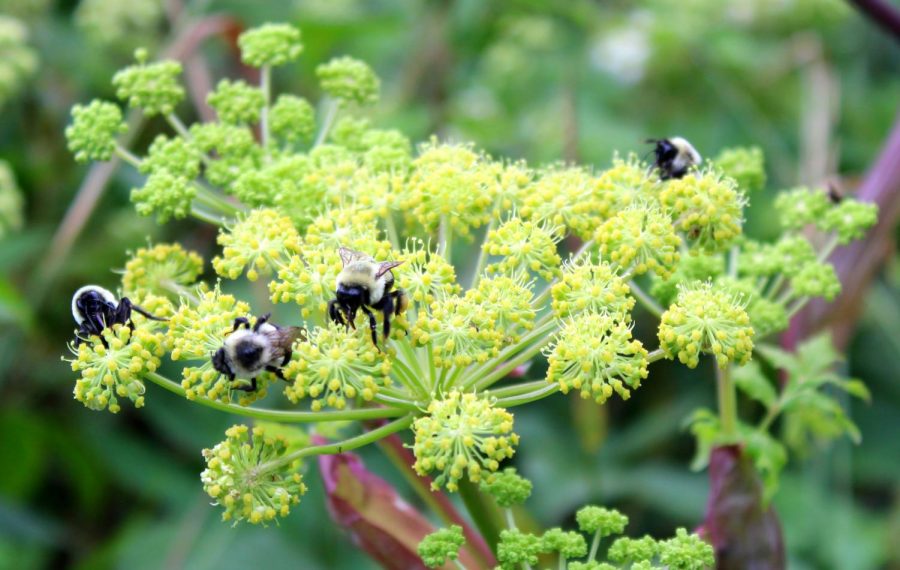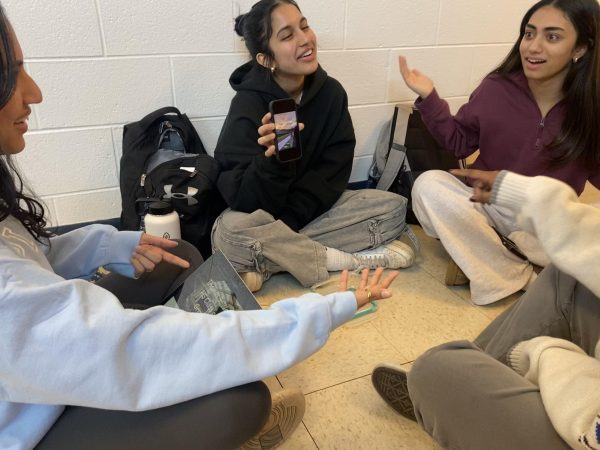The World is Ending: You’d better BEElieve it
Four bees pollinate a flower on Sugarloaf Mountain. Pollen from the flower sticks onto their furry bodies and is then carried to another plant, fertilizing it and fostering biodiversity.
America is living on the brink of a bee crisis, wobbling on the edge of a slippery slope toward mass malnutrition. Bee populations are rapidly declining, and it is largely humanity’s fault. “The topic of bee decline gets pushed to the side a lot along with other related environmental issues, so I hope to see an increase in awareness in the following years,” said senior Allison Yu, who wrote an AP research paper on the bee population decline from a historical perspective.
According to the Bee Informed Partnership (BIP), a non-profit organization that works to improve honey bee colony health and survival across the United States, beekeepers in the U.S. lost 9.6% more colonies over the winter in 2021 than in 2020. Even though it’s natural for beekeepers to lose a percentage of their honeybee colonies in winter, BIP also reported that over the 2021 winter, beekeepers lost 8.9% more colonies than was considered acceptable.
Factors like diseases, parasites, weather, starvation and queen failure are all recognized by The United States Department of Agriculture (USDA) as stressors to bee colony health, but over and above, human-made pesticides are widely considered to be the biggest contributor to the bee population decline. Take sulfoxaflor, more widely known as the insecticide Isoclast, for example. Sulfoxaflor has been linked to drastic and unexplainable changes in bee colony behavior such as Colony Collapse Disorder (CCD): a phenomenon where the majority of worker bees in a colony disappear, abandoning their queen and the colony to fall apart.
Another highly toxic class of pesticides that humans use in excess are neonicotinoids. When bees are exposed to neonicotinoids that have been sprayed on the crops they’re pollinating, the pesticide attacks their nervous systems, which can cause problems with flight and navigation, uncontrollable twitching or paralysis and even death. The most potent neonicotinoids are thousands of times more toxic to bees than DDT—which is the very pesticide globally acknowledged as detrimental to the environment after Rachel Carson published her book Silent Spring.
But, why does this matter? Aren’t all bees evil creatures that exist solely to cause humans pain?
Wrong. Bees play a vital role in pollentating the food that we eat. According to a 2021 study published in the scientific journal Insects, bee-pollinated crops contribute to approximately one-third of the total human dietary supply. Ninety crops essential for a healthy diet — including nuts, berries, and vegetables — all rely heavily on bee pollination. Almonds, in particular, depend almost exclusively on bees to pollinate them and ensure the survival of their species. “The fiber in these foods help to regulate the digestive system and also acts as fuel for the beneficial gut bacteria. These helpful bacteria work hard to keep us healthy,” nutrition teacher Kristen Daugherity said.
If the bee population dwindles down to extinction, there will be a global shortage of produce, and human health will suffer at an unprecedented rate. “The lack of sufficient fiber could lead to a reduction in the number of beneficial bacteria as well as digestive irregularities. Over time, there could be vitamin or mineral deficiencies [in humans],” Daugherity said.
Although there are other ways to obtain the necessary nutrients in produce, such as vitamin supplements, these replacement products can be expensive and inaccessible. “I play sports, so fruits and vegetables play a vital role in providing sufficient vitamins and nutrients to my body so that my body remains in good condition. If I didn’t have access to fruits and vegetables, I would have to find another to obtain missing nutrients… the problem is that they might not be 100% reliable,” Yu said.
Needless to say, without bees, it would be the end of the world as we know it.
Your donation will support the student journalists of Thomas S. Wootton High School. Your contribution will allow us to purchase equipment and cover our annual website hosting costs.
Catie is a 2023 graduate.







